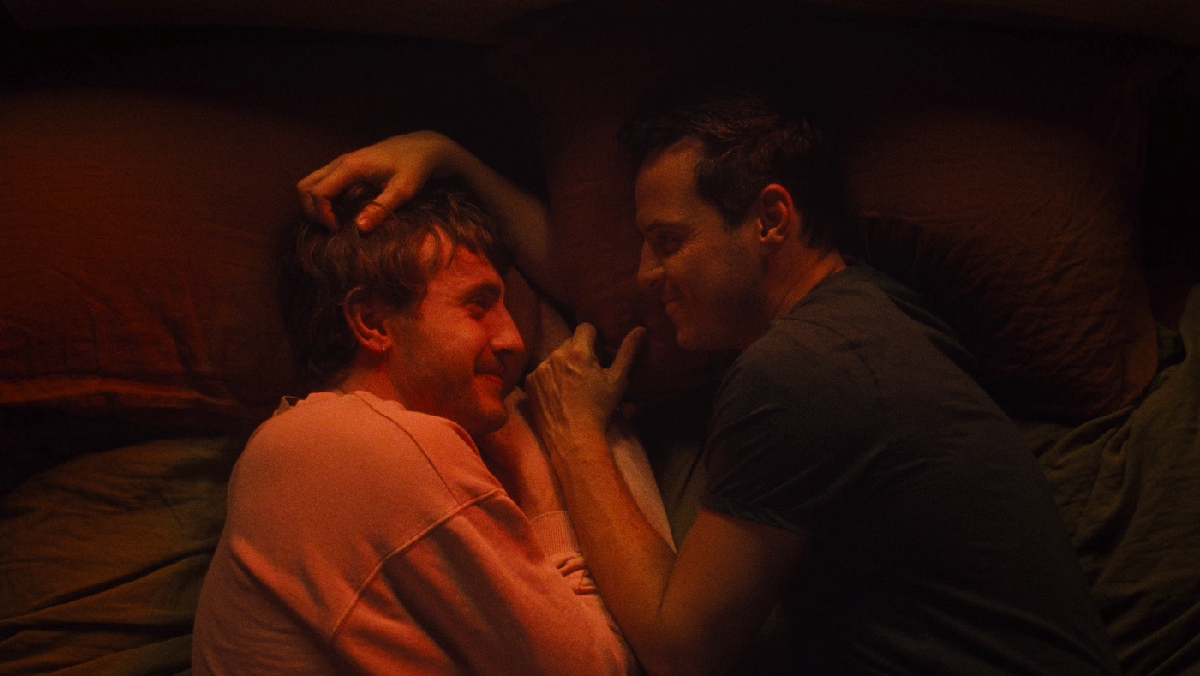
Courtesy of Searchlight Pictures
Harry (Paul Mescal) and Adam (Andrew Scott) in the new film "All of Us Strangers," a romantic fantasy.
Retrospection is a double-edged sword; opening oneself up to the past, what was lost and what wasn’t said can change a person. The power of love cracks a person open and spills out all the best and worst parts, all the love and all the loss. In writer/director Andrew Haigh’s newest film, “All of Us Strangers,” audiences are asked which comes out on top: the love or the loss. The film, based on the novel “Strangers” by Taichi Yamada and released January 19, mixes a slow burn romance between two lonely London residents, Adam and Harry (Andrew Scott and Paul Mescal, respectively), and Adam’s attempt to write about his life before he was orphaned at age 12.
In that mix, Haigh designs a film that starts as a somber, retrospective exploration of family and grief and morphs into a mesmerizing fantastical ghost story, beckoning Adam, and the audience, into self-forgiveness and acceptance.
In his attempt to go back to his life before his parents died in a tragic car crash, Adam re-visits his home outside of London in a much more suburban and traditional part of the country. He leaves behind the gay bars, grinding and ketamine to instead peer into his past, only to discover it might be his present too. When he meets his father (Jamie Bell) in the park, looking just as he did in the months leading up to his death, Adam steps back into his childhood from the ’80s and gets to visit with his mum (Claire Foy) and dad, picking up right where they left off.
Balancing his attempts to revisit his past, along with the burgeoning romance with Harry, proves to be no small task. Proving to a partner that you’ve seen the ghosts of your dead parents doesn’t sound like the most romantic of evenings. But the real meat of the film comes not in the forward progression of the, albeit somewhat loose, plot.
But rather, the most devastating parts of the film arrive in the smallest glances and mutterings in the most mundane of scenes. Haigh has always had a penchant for making the small moments of development in characters feel world-shifting, and with Scott’s talent behind the lead, together they’re able to craft a truly extraordinary character. Adam is someone that feels unique from any other gracing the screen today, but might still feel familiar to queer audiences, as Adam reflects the journey many experience trying to find their place in a family that doesn’t understand them.
On top of the ghost story looking the audience in the eye, whispers of homophobic rhetoric of decades gone, fears of AIDS ingrained in the culture and the ever-shifting landscape of queer liberation all run as undercurrents in the film, which create a rich and realist approach to a theme that many might have grappled with before.
It grounds the film in Haigh’s signature naturalist approach, where its source material focuses on the more magical elements. The adaptation into a contemporary queer context adds a layer of distance between the lead’s past and present, based in what has and has not changed, and the tension that arises from confronting the past while knowing how it shaped you.
The dream-like feel of the film is expanded upon in its refusal to explain how precisely it all works. Every ghost story has rules, the more obvious films frequently have a scene or montage dedicated to explaining each of them, and the plot is dependent on each of them. “All of Us Strangers” entirely skips over this, opting to instead let the audience read between the lines. Foy’s character even addresses this during the second act; Adam asks her if all of this is real, to which she replies, “Well, does it feel real?”
Haigh encourages viewers to open themselves up and ask not for what’s real, but instead how they react to what they’re seeing and feeling, and what it does to them.
While risks are inherent in any project as ambitious as this, Haigh and company are able to pull off an undeniably moving — and even somewhat sexy — look at the tensions of family and romance, and the way fear holds us back from the life and the love that people deserve to have. It’s really a love letter and a testament to the power of love (the concept and the song by Frankie Goes to Hollywood).